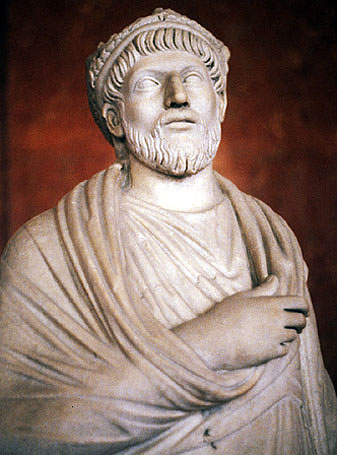Julian in the Desert May 6, 2011
Author: Beach Combing | in : Ancient , trackbackBeachcombing finished his last exam yesterday and, with the exceptions of the long and frankly tedious work of correction, term is now all but over. Hurrah! Hurrah!
By way of celebration Beachcombing thought that he would visit this morning one of his favourite hinge moments. The death of Julian the Apostate and with him the death of pagan antiquity and the triumph of ‘the Galilean’.
Julian, for those who might not have heard his happy name, is one of those quixotic characters who mess up the carefully laid schemes of historians: and who are typically written off as exceptions that prove the rule.
A Roman of extraordinary energy, in a period when the Empire was showing a sorry deficit of the same, he led armies against the German tribes and against the Persians, reconquering the respect that Rome had earned from its neighbours in previous generations.
Most interestingly though fifty years after the Edict of Tolerance he was a pagan. In an age when Christians had turned from lambs to lions and had begun to persecute their erstwhile persecutors, Julian tried to turn back the clock. He alone of the late Emperors rejected the Gospels, and with his extraordinary will-power attempted to reintroduce Greco-Roman paganism to a churchgoing Empire.
Nor was this paganism just the ‘village’ heathenism of the fourth and fifth centuries: here was a philosophical brand, born of the copulation of Plato and Venus, involving high-flown discourse and, strangely, vast numbers of animal sacrifices.
Julian was a man of such extraordinary energy that with a forty year reign he might have been able to defeat Christianity, creating a Platonic Hinduism to take its place: a religion that could bridge the gap between monotheism and polytheism.
But the ancients believed that the most beautiful and the best of the young are taken by the jealous gods who demand their company: Julian ruled only from 360-363, from twenty nine to thirty two, before dying from a chance and unnecessary injury in battle.
His undoing was a daring campaign in which he led his troops on against Rome’s oldest enemy, Persia.
In the spring of 363 Julian passed into Persian territory with almost a hundred thousand men, having decided on crossing the Syrian desert, planning on the capture of the Persian capital, Ctesiphon.
Julian, in fact, reached Ctesiphon but though he defeated a Persian army before its gates he was then forced to retreat as the city’s defences were just too impressive for a Roman force far from home.
It was on this retreat while being harassed out in the sands by Persian irregulars that he and his dream of a new paganism met their death.
Rushing out to defend his column – Julian always led from the front – the Roman Emperor grabbed his sword but did not take the time to strap his mail on. It proved, a fatal mistake.
As he rode out a javelin, probably thrown by a Persian Saracen, pierced his side and clipped his liver.
For more than two days Julian’s doctors struggled to save him but all was in vain and eventually Julian gathered his officers around him and admitted his passing – three centuries late the historical reflex of ‘the Great god Pan is dead’.
‘Meanwhile all those who were present wept, whereupon even then maintaining his authority, Julian chided them, saying that it was unworthy to mourn for a prince who was called to union with heaven and the stars. As this made them all silent, he himself engaged with the philosophers Maximus and Priscus in an intricate discussion about the nobility of the soul. Suddenly the wound in his pierced side opened wide, the pressure of the blood checked his breath, and after a draught of cold water for which he had asked, in the gloom of midnight, he passed quietly away in the thirty-second year of his age.’
et flentes inter haec omnes qui aderant auctoritate integra etiam tum increpabat, humile esse caelo sideribusque conciliatum lugeri principem dicens. quibus ideo iam silentibus ipse cum Maximo et Prisco philosophis super animorum sublimitate perplexius disputans, hiante latius suffossi lateris vulnere et spiritum tumore cohibente venarum, epota gelida aqua, quam petiit medio noctis horrore, vita facilius est absolutus anno aetatis altero et tricensimo.
Gulp.
Beachcombing particularly likes the detail of the dying Emperor discoursing on the soul with his teachers in the tradition of Socrates and is reminded of Callimachus: ‘Farewell O sun’, Cleombrotus cried, Then from a lofty wall to Hades hied: Him to his death no desperate grief had led, But Plato on the Soul this man had read.’
A partisan of Julian, Ammianus Marcellinus writes that: ‘Vir profecto heroicis connumerandus ingeniis, claritudine rerum et coalita maiestate conspicuus’. (He was a man truly to be counted with the spirits of the heroes, distinguished for his illustrious deeds and his innate majesty.)
Rome would not see his like again: Adrianople, a frozen Rhine, the loss of the Britains and the sack of the urbs awaited.
Beachcombing is always looking for moments where ‘everything changed’: drbeachcombing AT yahoo DOT com



